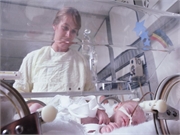- The Long-Term Effects of Daily Turmeric Supplements on Liver Health
- Could Your Grocery Store Meat Be Causing Recurring UTIs?
- Are You Making This Expensive Thermostat Error This Winter?
- Recognizing the Signs of Hypothyroidism
- 10 Strategies to Overcome Insomnia
- Could Artificial Sweeteners Be Aging the Brain Faster?
- Techniques for Soothing Your Nervous System
- Does the Water in Your House Smell Funny? Here’s Why
- Can a Daily Dose of Apple Cider Vinegar Actually Aid Weight Loss?
- 6 Health Beverages That Can Actually Spike Your Blood Sugar
Abnormal Gut Microbiome May Stunt Preemies’ Growth

The gut microbiome of premature infants in neonatal intensive care units (NICUs) may hinder their future growth, new research shows.
The study included 78 infants who weighed less than 3 pounds at birth. Their stool samples were tested weekly for their first six weeks in the NICU, and the results showed that all of the infants had an extremely abnormal gut microbiome, a condition called dysbiosis.
The researchers followed up with 24 of the children when they were aged 2 and 4 years.
The more abnormal their gut microbiome, the more likely infants were to have stunted growth, even at 4 years of age, according to the study presented last week at the World of Microbiome Conference, in Milan, Italy.
Poor growth in premature infants is well-documented, but the role of the microbiome has not been investigated, the study authors said. The microbiome controls digestion and the immune system.
Most premature babies stay in the NICU for several months, where they undergo stressful invasive procedures, receive multiple antibiotics and have limited contact with their mother, the researchers noted. So the babies often consume more formula than breast milk. Breast milk is known to transfer beneficial gut bacteria from the mother to her infant.
“These infants have come into this world having already experienced major stress in the womb,” said study lead author Maureen Groer, a professor of nursing and internal medicine at the University of South Florida.
Their degree of immaturity and the necessary treatments that are provided in the NICU also play a role in the babies’ abnormal gut microbiomes, she noted in a university news release.
New treatments, such as special probiotics, are needed to help boost the growth of NICU infants, according to Groer. This may help with early diagnosis and treatment of chronic bowel disease, autoimmune disease, and also reduce allergies.
Groer and her colleagues are now examining how the gut microbiome of NICU infants affects their brain development and future behavior.
Research presented at medical meetings should be viewed as preliminary until published in a peer-reviewed journal.
More information
The March of Dimes has more on the NICU.
Source: HealthDay
Copyright © 2026 HealthDay. All rights reserved.










